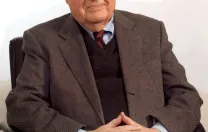D. Ronald Daniel: While the bylaws do not set any limits with respect to time or age, within the last 10 years the Corporation itself has more or less agreed that 10 years or age 72, depending on when somebody arrives at the Corporation, would be the standard. So that when you’re talking to a potential new member, as I suspect they were with Pat King [Patricia A. King, whose appointment was announced December 4], they were probably talking to her about 10 years or so.
Henry Rosovsky: It’s often said about the Corporation that it is a self-perpetuating body and that is often raised in a spirit of criticism. But as a member of the Corporation pointed out to me not long ago, most bodies of this kind are self-perpetuating. Boards of private companies are not in any meaningful sense elected. They are perpetuated through their governance structure. And here, there is a great deal of consultation in the selection of new members. The matter also goes to the Overseers. Overseers are actually members of search committees. The faculty is widely solicited; experts are, too. So I think the fact that they are “self-perpetuating” is not that unusual.
Richard Chait: It’s not unusual except for the fact that, one, you’d have to exclude all public-sector universities, none of whose boards are self-perpetuating. And then among private colleges and universities, a large number have constituents who elect members. So that’s a much more participatory process.
Rosovsky: But of course we elect the Overseers.
Chait: Right. Elsewhere there are alumni elections or elections by denominations, in the case of church-related institutions, or various subsets of voters or constituents. But when there’s self-perpetuation without term limits, that’s different.
* * *
Chait: One huge asset in the Corporation that we probably don’t appreciate enough is that it’s the only place I know in the not-for-profit sector where governance and philanthropy are separated. Most other boards that deal with governance are so warped by issues of philanthropy.
Rosovsky: The Overseers are elected by the alumni, and that has prevented “selling” of those seats, too.
Chait: In all other instances, governance becomes dominated not by the power of ideas but by the power of the purse, and individuals of enormous means have disproportionate influence over the course of governance of nonprofits. So that’s a huge plus for Harvard.
I think Henry once mentioned to me that of the 100 or so largest gifts ever given to the University, very few came from people who were members of the Corporation. And that would be untrue of almost every other nonprofit. So we do not have a set of problems that I have to confront all the time when I work with nonprofit boards.
Daniel: In all of the conversations I’ve heard about new Corporation members, personal wealth has never been mentioned.
* * *
Jay Lorsch: I understand that Harvard really is the only private university that has this two-board structure.
Chait: I believe that Brown, Cornell, and perhaps MIT have two-tier or two-board structures.
Lorsch: Let me come back to the selection process. In a sense, Henry, you’re absolutely right that if you look at a publicly owned corporation, the process by which directors get elected or selected and put up to the shareholders for a vote is not dissimilar to the way the Harvard Corporation members are selected in reality. The difference, however, and one of the problems that the Corporation may have when it gets criticized, is there’s not much transparency to the processes by which these things are done. So I think over the years a lot of suspicion has built up that the members of the Corporation just pick one of their buddies to be the next person.
Rosovsky: Right.
Lorsch: Which, as I understand it, is not true. So one of the things that may be required as you think about the future is how to make this process a little bit more transparent, so people understand how these decisions are made. I think that would reduce the criticism that sometimes occurs.
Rosovsky: I couldn’t agree more. I think that applies to all of Harvard’s practices. The institution has everything to gain by explaining them more, for just the reasons you indicated.
u u u
Lorsch: I think the small size of the Corporation has got to be important. One of the things we know from corporate boards is that if they get too big, they don’t work at all, but this thing stays small and is actually smallerI looked at the size of the other Ivy League governing boards and this is much smaller. That’s something that ought to be said. It has a problem if you’re trying to get representation, obviously, but it’s maybe part of why it works.
Chait: Not only is it smaller, Jay, but what I didn’t appreciate is the degree to which it’s individualized.
Lorsch: Good point.
Chait: I did not have an appreciation of the degree to which it is this unorchestrated effort on the part of the Corporationthat individual members select areas of interest, advise on issues that they deem to be urgent or relevant, and others do not and in some cases are relatively less informed.
* * *
Moderator: Compared to other boards, the Corporation is not only smaller but it also seems to meet more frequently and for much longer periods than other boardsto require greater involvement in time.
Lorsch: How frequently does it meet?
Daniel: It now meets about 14 times a year. It met 20 times when Henry and I were appointed.
Lorsch: And those meetings last for what, five or six hours?
Daniel: They usually start at nine and go through lunch.
Rosovsky: They’ve changed nowsometimes they start in the afternoon and run into later in the day. The time commitment was longer when you and I were there, but before that I think it had even been…
Daniel: More. It was almost every other week at one time.
* * *
Lorsch: The Senior Fellow, does he play any kind of a role? The impression I’ve gotten is that the president really acts as the chair of the Corporation.
Rosovsky: Yes, he is the chair.
Lorsch: What is the role of the Senior Fellow, then?
Daniel: It’s twofold: to lead the presidential search committee when the process is under way and to represent the members of the Corporation in feedback to the president on performance, which at least now happens annually.
Rosovsky: That’s a relatively new thing.
Lorsch: So that’s an adoption of good practice from the corporate world.
Daniel: Yes. There are actually several meetings set aside in the spring for the Corporation ex the president to meet to talk about the year and the president’s performance, and at the beginning of the academic year there’s a conversation with the president about priorities. Jamie [Houghton, Senior Fellow] would lead that conversation.
Lorsch: Just one final question. There are no committees? I mean the Corporation doesn’t have an audit committee or a compensation committee?
Daniel: There’s a Joint Committee on Inspection, made up of Corporation members and Overseers, that functions as an audit committee. There’s also a Joint Committee on Appointments that reviews tenure cases.
Rosovsky: University-wide, you understand.
Daniel: And focused much more on the integrity of the process than on specific names. Then there is the Corporation Committee on Shareholder Responsibility. So there are a number of committeesalso an honorary-degree committee.
Rosovsky: There are also ad hoc committees. For example, I was put on a committee with Overseers at the time of the South African divestment issue.






